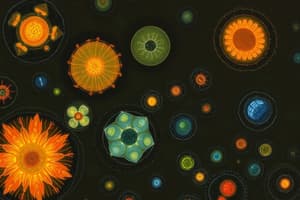Podcast
Questions and Answers
¿Qué tipo de células se encuentran en bacterias y arqueas?
¿Qué tipo de células se encuentran en bacterias y arqueas?
Células procariotas
¿En qué se diferencian las células eucariotas de las procariotas?
¿En qué se diferencian las células eucariotas de las procariotas?
Las células eucariotas tienen núcleos con ADN, mientras que las procariotas no.
¿Cuál es la función principal de las células musculares?
¿Cuál es la función principal de las células musculares?
Contracción y relajación para mover los miembros del cuerpo.
¿Qué tipo de células protegen contra infecciones y la deshidratación?
¿Qué tipo de células protegen contra infecciones y la deshidratación?
¿Qué tipo de células transmiten señales eléctricas involucradas en el pensamiento y las emociones?
¿Qué tipo de células transmiten señales eléctricas involucradas en el pensamiento y las emociones?
Flashcards are hidden until you start studying
Study Notes
What is a Cell?
Cells are the smallest living units of all living organisms. They are microscopic structures composed of specialized molecules known as proteins and other organic molecules. In biology, they are considered to be the building blocks of life as we know it because they contain the genetic material necessary to carry out their functions within the body. For instance, cells produce enzymes to digest food, remove waste from our bodies, and regulate body temperature.
There are two types of cells: prokaryotic cells found in bacteria and archaea, and eukaryotic cells present in plants, animals, fungi, protists, and some algae. Eukaryotic cells have membrane-bound nuclei containing DNA while bacterial cells do not. This difference helps us understand why each type of cell can only reproduce itself, rather than combining into something new like humans can when mating.
In addition to the basic structure common to most cells - cytoplasm, plasma membranes, and nucleus - there are numerous types of cells with various specializations depending on what part of your body they're in. For example, skin cells protect against infection and dehydration; muscle cells contract and relax to move limbs; brain cells transmit electrical signals involved in thinking and feeling emotions. These different kinds of cells make up tissues such as bone tissue or heart tissue.
The human body consists of trillions upon trillions of these tiny cells working together to keep everything running smoothly. Each one has its own set of instructions telling it how to behave based on its position within this complex network called homeostasis.
Studying That Suits You
Use AI to generate personalized quizzes and flashcards to suit your learning preferences.




